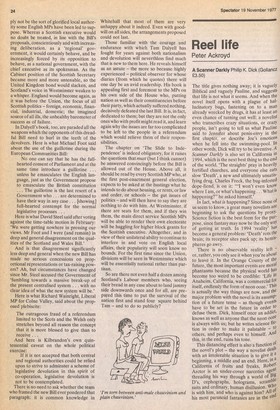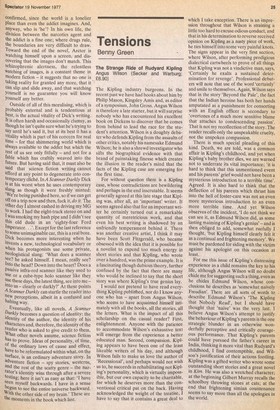Reel life
Peter Ackroyd
A Scanner Darkly Philip K. Dick (Gollanci SZ3 . 50) The title gives nothing away; it is vaguely Biblical and vaguely Pauline, and suggests that life is not what it seems. And when the novel itself opens with a plague of hallucinatory bugs, fastening on to a man already wrecked by drugs, it has at least an even chance of turning out well: a novelist who transcribes crazy situations, or crazY people, isn't going to tell us what Pauline said to Jennifer about penis-envy in the first chapter, or describe Joe's emotions when he fell into the swimming-pool. In other words, Dick will try to be inventive. A Scanner Darkly is also set in California 11 1994, which is the next best thing to the end of the world. 'The straights' pray in heavily fortified churches, and everyone else eats slow 'Death', a new and ultimately unsatisfying drug. Charles Freck, the bug-infested dope-fiend, is on it: "I won't even know where I am, or what's happening What is happening?" he asked himself.' In fact, what is happening? Since none of us seem to know, a great many novelists are beginning to ask the questions by proXY. Science fiction is the best form for the pur' pose, since fantasy may now be the only waY of getting at truth. In 1994 'reality' has become a general problem: 'Death' rots the brain; its receptor sites pack up; its hernis' pheres go awry. There is no observable reality left " or, rather, you only see it when you're about to leave it. In the Orange County of the future, the most important events are moral phantasms because the physical world has become too weird to be credible: 'Life in Anaheim, California, was a commercial Iar itself, endlessly the form of neon ooze.' This is actually the way things are now, and the major problem with the novel is its assunir tion of a future tense — as though events have to be set in the future in order to defuse them. Dick, himself once an addict, knows as well as anyone that the neon ooze is always with us; but he writes science fio" tion in order to make it palatable — re, others, and perhaps even to himself. Ana this, in the end, ruins his tone. This distancing effect is also a function al the novel's plot — the way a novelist deals with an intolerable situation is to give it a beginning, a middle and an end. Here, in a California of fruits and freaks, Robert Arctor is an under-cover narcotics ago,!' threading his way through a world of Big D's, cephographs, holograms, scramble Suits and ordinary, human disillusion. Wlle, is with him, and who is against him? Ali°,1his most paranoid fantasies are in the erl" confirmed, since the world is a lonelier Place than even the addict imagines. And, anyway, who is 'he'? In his own life, the division between the narcotics agent and the addict is a fine one; where drugs rule, the boundaries are very difficult to draw. Toward the end of the novel, Arctor is watching himself upon a screen, and dis covering that the images don't match. This schizophrenic alertness, the relentless watching of images, is a constant theme in modern fiction — it suggests that no one is taking reality for granted any more, that it can slip and slide away, and that watching Yourself is no guarantee you will know Yourself any better.
Outside of all of this moralising, which. is Probably external and is tendentious at best, is the actual vitality of Dick's writing. It is often harsh and occasionally clumsy, as though he isn't quite sure what he's trying to say until he's said it, but at its best it has a v.itality which is part of his concern for real time — for that shimmering world which is always available to the addict but which the rest of us see only fitfully — and not for a fable which has craftily weaved into the future. But having said that, it must also be said that science fiction writing cannot afford at any point to degenerate into contemporary cliché. InA Scanner Darkly Dick Is at his worst when he uses contemporary !Wig as though it were freshly minted: We're being punished here, so if we can get off on a trip now and then, fuck it, do it. The Other day I almost cashed in driving my MG to work. I had the eight-track stereo on and I was smoking my hash pipe and I didn't see this old dude in an 'eighty-four Ford IMperator. . Except for the last reference to some unimaginable car, this is a real bore. Pick becomes more interesting when he invents a new, technological vocabulary or When his protagonists use some private, neologistical slang: 'What does a scanner s,ec? he asked himself. I mean, really see? into the head? Down into the heart? Does a Passive infra-red scanner like they used to use or a cube-type holo scanner like they Use these days, the latest thing, see into me — into us — clearly or darkly?' At these points A Scanner Darkly can startle the reader into new perceptions, albeit in a confused and halting way.
Eventually, like all novels, A Scanner Darkly becomes a question of identity: the identity of the author, the identity of his Characters and, therefore, the identity of the reader who is asked to give credit to them. What other novels assume, science fiction has to prove. Ideas of personality, of time, of the ordinary laws of cause and effect, have to be reformulated within what, on the surface, is an ordinary adventure story. In adventure fiction — spy stories, westerns, and the rest of the scatty genre — the narrator's identity wins through after a severe testing; here it isn't as easy as that: have seen myself backwards. I have in a sense begun to see the entire universe backward. With the other side of my brain.' These are the moments in the book which last.



































 Previous page
Previous page